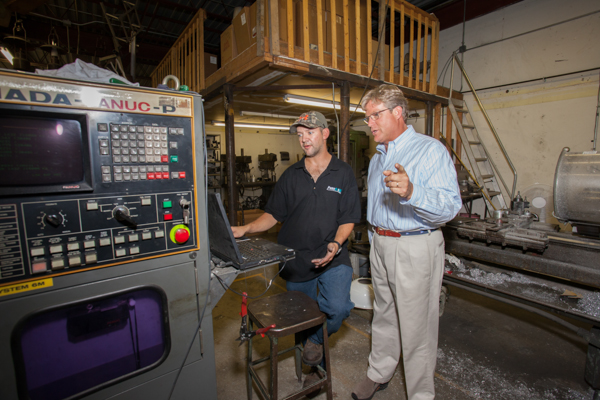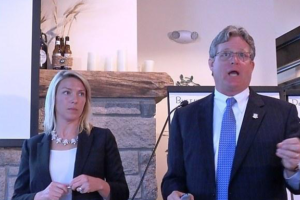Creating a more business-friendly environment is the most critical issue facing our state. There needs to be much more collaboration between state and business that will spark economic growth and create skilled jobs for the 12th District.
Historically, Connecticut has had a strong economy with the highest wealth per capita, and some of the best universities in the nation. However, many business leaders point to a number of factors in our sluggish economy: the high cost of doing business in Connecticut, slow job growth and out-of-state relocation of many businesses.
As a successful business entrepreneur and attorney specializing in regulatory law and the ways that government regulations impact business, Ted knows how businesses can struggle with needlessly complex regulations. Through innovative laws, Ted has started to alleviate the uncertainty and unpredictability of confusing government regulations. He understands how the right incentives can help businesses grow and the wrong rules can suffocate business development.
Ted believes the solution to the State’s economic challenges lies right in front of us—in our many businesses, small and large; in our prime location, between New York and Boston; and in our talented workforce. One key to unlocking Connecticut’s potential is cooperation between government and business to build on our strengths, minimize our weaknesses, and capitalize on our region’s competitive advantages.
In April of 2016, Ted joined with the Shoreline Chamber of Commerce to convene the first-ever Shoreline Economic Strategic Planning Summit. Nearly 200 local business leaders shared their ideas about the key drivers of economic activity and job growth – and provided an honest appraisal of unnecessary red tape, regulatory blockades and taxes. Conversations like these are critical to finding actionable ways that government can work together.

Ted has brought clarity, new ideas, and a wealth of expertise to find solutions to help retain and develop Connecticut’s business and grow our economy. As your State Senator, Ted has and will continue to:
1. Work hand in hand with small business
Small businesses in the 12th District represent the backbone of our local economy. They understand that economic prosperity is not just about lower taxes, state-financed incentives, and reduced regulation. They know firsthand the pressing need to modernize our transportation system, retain Connecticut’s young, educated workers, and develop more targeted vocational and technical training opportunities. Their knowledge and experience forms the basis of Ted’s efforts to make these goals reality. Ted constantly consults with small businesses for ways to grow jobs in the region. He is always working with area businesses to identify and cut bureaucratic red tape.
Ted believes we need a more collaborative effort between small businesses and local governments in order to bring smart business principles to the management of our towns. The time has come to consider creative approaches for reducing property taxes, streamlining permitting processes, and sharing municipal costs, such as the voluntary shared services initiative suggested by the Connecticut Council of Small Towns.
Ted took action by aiding in eliminating costs to new business. Though Senate Bill 303 Ted assisted in creating a pilot program for entrepreneurs to reduce state fees when starting a business. Senate Bill 303 now Public Act 16-1 will reimburse qualifying entrepreneurs for state fees associated with forming a business.
Ted continued to ease onerous regulations levied on businesses through voting to override Governor Malloy’s veto of SB 302. SB 302 is important to small businesses because it requires state agencies to conduct an economic impact analysis of proposed regulations on small businesses before the regulation can be approved. This will give a clear picture to businesses what the economic effect a bill would have on them going forward.
Ted also assisted in removing governmental red tape for businesses while still protecting the environment. As chairman of the Senate Environmental Committee, Ted defined the word “spill” when relating to an environmental spill. Previously, businesses were required to report all “spills”, even as little as dropping a cup of sports drink off the side of a boat. Ted clarified the definition to focus only on spills which were an environmental or public health risk, thus reducing the regulatory burden placed on businesses and the state.
2. Ensure that taxpayer-financed business incentives deliver jobs
Connecticut offers a variety of tax incentives and loan programs to attract and retain businesses here. Many of these, such as the Small Business Express and STEP-Up programs, have helped grow businesses in the 12th District. Some great examples in our district include PennGlobe, a North Branford manufacturer of street lighting, Perk on Main, a popular Durham and Guilford coffee shop, and the Madison Arts Cinemas, an area theater treasure, which have all created and supported new jobs with the help of Small Business Express programs.
We need a better vetting system for our investments especially programs like Small Business Express. We cannot afford to waste taxpayer monies and need to be smart about how to use our valuable, but scarce, resources. Ted will advocate for a system to evaluate which businesses are best positioned to benefit from state-financed loans and incentives.
3. Promote Connecticut’s competitive edge
Connecticut is a great place to do business. Studies show we are leaders in business research, finance and insurance, patent applications, and exports. Connecticut is home to 19 Fortune 500 companies, and has some of the most productive workers in the country.1
Our proximity to major metropolitan areas like New York and Boston make Connecticut an ideal location. Our well-educated workforce and the availability of some of our nation’s best educational institutions give businesses an even greater advantage. Our leading medical facilities and biotech firms create an environment for innovation, economic development, and job growth.
Here in the 12th District, we have many exciting examples of dynamic connections. For example, in Branford, a biotech cluster including AxioMx, Ancera, IsoPlexis and Mount Sinai Genetic Testing Laboratory Facility that collectively together are projecting 50-100 jobs in the very near future. In Madison, healthcare software companies like Clarity Software Solutions project similar successes. Ted thinks we need to take full advantage of our local research university resources to help academic researchers connect with venture capitalists so scientists can commercialize their ideas and inventions. Another goal which Ted has is to facilitate closer cooperation between innovators and the state, Connecticut should be doing everything it can to capitalize on our growing biotech cluster, reducing red tape to better situate the state as a biotech destination.
Tourism represents another underdeveloped competitive advantage for the 12th District. Our area’s tourist attractions, historic shopping districts, art galleries, and great restaurants are excellent examples of local businesses creating jobs and economic vitality. Our towns have a wealth of historic, cultural, agricultural, and recreational attractions for visitors from all over the U.S. and the world. Ted believes we must work to support these local resources through the continuation of state tourism funding, better signage on state highways, and an increased presence in the State’s marketing efforts. We must develop a strategic marketing plan to address the unique tourism destinations of our dynamic region.
Ted believes we must heavily promote all of our region’s assets because they give the 12th District—and Connecticut—a highly competitive edge. He understands that creative collaborations between educational institutions, government, and business can kick-off exciting possibilities. Ted knows the 12th District has impressive and untapped resources that offer new and intriguing business opportunities
4. Bring the skills of our workforce into the 21st century
Businesses depend on a strong, local workforce for their success, especially in the aerospace and manufacturing sectors, and the demand for skilled labor is expected to increase. State economists “project that the manufacturing sector will hire 2,200 workers each year for the foreseeable future.”2 However, Connecticut manufacturers report a significant skills gap: despite hundreds of job openings, we do not have enough trained, local applicants to fill those positions.
While Connecticut’s workforce is among the most educated in the nation, many of its skills do not match the jobs now being created. Although Connecticut has an array of community colleges, vocational, and technical schools, and offers many workforce training programs, Ted believes we need to better develop these educational opportunities to meet the 21st century needs of local businesses and industry.
Ted knows government must work more closely with businesses to better identify the specific skills needed for the future so that people get the appropriate training for next year’s—not last year’s—jobs. Companies follow talent: the more competitive Connecticut’s workforce, the more businesses will move and start here. Ted will also fight to bolster state-financed tuition programs for students to learn how to use sophisticated machines so they will be job-ready. If our young people can get local jobs, they will stay and settle in Connecticut.
This forward-thinking approach will help strengthen the middle class and assure that Connecticut residents, especially our young people, can secure meaningful employment.
5. Modernize our transportation system
The 12th District lies along one of the busiest transportation corridors in the U.S., where antiquated rail and road networks make for constant traffic and frequent accidents. We must fix our crumbling bridges, railways, and roads. Infrastructure investment connects workers with good jobs and business with new markets, and it creates well-paying construction jobs in the process.
Both business leaders and citizens understand the connection between infrastructure and our economy. In fact, business leaders from both political parties cite infrastructure improvement as one of Connecticut’s top priorities, including the need to “identify and accelerate priority investments in roads, bridges, transit systems, and air and seaports.”3
With this kind of strong support and with borrowing cost at historically low levels, Ted believes now is the time for a bipartisan agreement on this smart investment in our future. Ted understands these improvements will have direct, local impact, attracting new businesses and jobs, increasing property values, and alleviating concerns about commuting times and congestion. Ted will continue to push for a long-term plan for the modernization of Connecticut’s infrastructure, and work to create consensus in Hartford for this change.
See Also EDUCATION: Develop Innovative Approaches for Higher Education
1. http://www.courant.com/business/hc-fortune-500-connecticut-20160606-story.html
2. “Biden At Goodwin: Job Training A Community Effort,” Hartford Courant, August 21, 2014.
3. CBIA, CT20x17 campaign, http://www.ct20x17.org/

